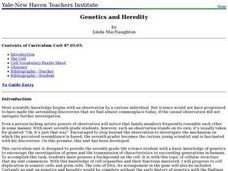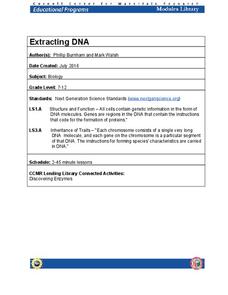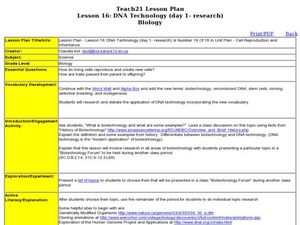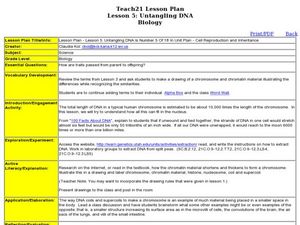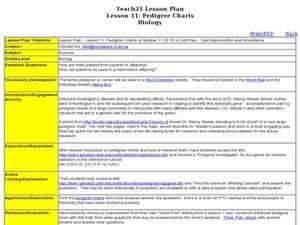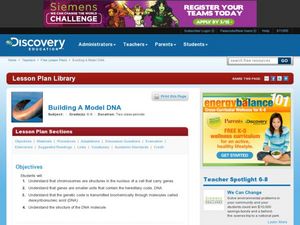Curated OER
Biology: Genetics and Heredity
Seventh graders explore the connection between genetics and heredity by examining the cellular structure. Among the numerous activities to engage students are drawing DNA molecules, vocabulary puzzle sheets, and predicting possible...
Cornell University
Extracting DNA
Uncover the basics of DNA structure through exploration activities. Collaborative groups build DNA models and recreate the process of replication. Then, using plant cells such as peas or strawberries, they extract a DNA sample.
Curated OER
DNA, the Awesome Thread of Life
Students examine how traits are passed to offspring. In this genetic reproduction lesson students develop a model of dna and learn about its structure, replication and function.
Serendip
DNA
Get up close and personal with DNA! A two-part hands-on activity has learners extract DNA from a small organism and then their own cheek cells. Scholars then explore DNA replication using questions to guide their analyses.
LABScI
Circulation and Respiration: Vital Signs
What do your vital signs tell your doctor? An engaging hands-on lesson has your learners monitor their own lung capacity, blood pressure, and heart rate. They then connect the vital measures to the workings of the circulatory and...
Curated OER
Cell Reproduction and Inheritance
Students determine their inherited characteristics from their parents. In this biology lesson, students study the life of Mendel using an interactive website. They differentiate dominant and recessive characteristics.
Nuffield Foundation
Interpreting an Investigation of Plant Hormones
How important is the tip of a new shoot on a growing plant? Individuals learn about the results of experiments on shoot tips and must interpret them. They apply previous learning and connect complex ideas through advanced analysis.
Curated OER
The Great Archeological Dig
Students explore biology by identifying a diagram. In this cell anatomy lesson, students read a story about archeology and conduct a fictitious archeology dig in class in which they search for animal cells. Students define a list of...
Curated OER
Dibble Pond Ecosystem
Students collect specimen and analyze it. In this biology instructional activity, students analyze and evaluate the diversity found in specific environment. They use the correct terminology as they do their write up for the experiment.
Curated OER
Lesson 16: DNA Technology
Students research different areas of biotechnology. In this biology lesson, students create a presentation about their research. They debate the topic presented and share their views on the subject.
Curated OER
Lesson 14: Genetic Disorders
Students create PowerPoint presentation on the topic they researched. In this biology lesson, students fill out a storyboard about their topic. They share their project in class.
Curated OER
Lesson 5: Untangling DNA
Students extract DNA from split peas. In this biology lesson, students research how chromatin form into chromosomes. They draw the stages and present their work in class.
Curated OER
Lesson 10: Karyotypes
Students predict traits of future offspring. In this biology lesson, students study karyotyping to predict genetic disorders. They research an assigned karyotype and present information about it.
Curated OER
Lesson 9: Visual Meiosis
Students create a fictional organism. In this biology lesson, students predict the traits of resulting offspring. They complete activity worksheet and discuss answers in class.
Curated OER
Pedigree Charts
Pupils explain how offspring inherit traits from their parents. In this biology lesson, students investigate the genes for nicotine addiction using an interactive website. They construct a fictional pedigree using their chosen...
Curated OER
Cell 5 Diffusion and Osmosis
Students distinguish between active and passive transport. Students identify key words associated with active and passive transport. They draw and explain the structure f the cellular membrane. They are able to define phospholipid...
Virginia Department of Education
The Ratio of Surface Area to Volume
Demonstrate the ratio of surface area to volume in your high school class by using phenolphthalein, gelatin, and an onion. Intrigue the class by leading a discussion on osmosis and diffusion, then making "scientific jello." Participants...
Virginia Department of Education
Genetic Variation and Mutations
Young scientists demonstrate their creativity while completing several activities, to assess genetic variations and mutations. Instructors provide a list of options and scientists choose to write a comic strip, create a book,...
Curated OER
Strawberry Smoothies
Biologists extract the DNA from a strawberry. After completing the procedure, learners write answers to a few questions on the lab sheet provided. This is ideal lab practice during a DNA unit in your general biology course.
Curated OER
Characteristics of Living Things
Seventh graders identify the characteristics of living and non-living things. For this biology lesson, 7th graders define vocabulary words as they go through the lesson. They answer a crossword puzzle after class discussion.
Curated OER
Building a Model DNA
Students explain the function of DNA in the body. In this biology lesson, students build a DNA model using simple materials. They demonstrate how bases pair up in the helix.
Curated OER
H2O in Us
Students discover through this activity that all organisms are composed of water. They find that 70 percent of their bodies are made up of water that is in thier cells and blood, and not free-flowing throughout their body.
Curated OER
Nucleic Acids and Protein Synthesis
Tenth graders complete a vocabulary assignment based on terms in the unit. They complete appropriate worksheets as each section of the unit is completed. They participate in classroom discussions. They construct a model of a DNA molecule.
Curated OER
The Electrophoresis of Human Hemoglobin
High schoolers are presented with a scenario that requires them to electrophoreses human hemoglobin samples in order to confirm a diagnosis of sickle cell anemia and/or to determine whether individuals in the scenario are carriers of the...
